This time last year, I was reviewing my favourite Asia cinema releases of 2019. As we reach the very end of 2020, it’s a very different film landscape.
Despite the lower number of cinema releases, my list of 20 Asian films to watch out for in 2020 has consistently remained one of my most-viewed posts of the year. Strangely, it’s still far more accurate than my more general list. The retrospectively optimistic piece saw at least half of it’s films out in some form, so it had a higher hit rate than the Hollywood and indie list.
So, instead of ranking and listing films as I normally would, here’s a potted summary of things that came out, things I thought were worth watching and the stuff I wrote about.
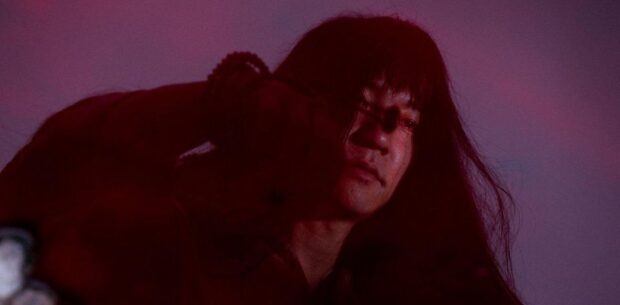
Japan
Given that 2020 was the year I started studying the Japanese language, it’s unsurprising that the bulk of my watching fell under Nihon no eiga. The industry emerged from the inward-looking approach of the last few years, competing internationally at with films like Naomi Kawase’s True Mothers.
If the world had not been actually plagued by a global pandemic, Toshiaki Toyoda’s DAY OF DESTRUCTION, would have dropped in Japanese cinemas on 24 July, the opening day of the Tokyo Olympics. (Indeed, Kawase was set to direct the official film of the games). It remains the first of several visceral films that emerged from the COVID-19 era, with its frenetic mixture of sound, vision and fury that is impossible to be apathetic about.
Similarly, several films reflected on the Fukushima tragedy and surrounding areas almost a decade on. Nobuhiro Suwa’s beautiful and intense VOICES IN THE WIND continues the conversation around grief and healing is only just beginning for a generation; while Setsuro Wakamatsu’s blockbuster FUKUSHIMA 50 was a high budget film that remained centrist in its politics.
Tatsushi Omori’s intense character study MOTHER, released internationally on Netflix, is a harrowing but essential piece of contemporary Japanese cinema. Led by remarkable performances from Masami Nagasawa and newcomers Sho Gunji and Daiken Okudaira (playing her son at different ages), this exploration of a toxic mother/son relationship is sensational without being sensationalised.
Cult favourite Sion Sono delivered his most accessible and joyfully strange dissection of the film industry in RED POST ON ESCHER STREET, and also penned the epic ‘single take’ CRAZY SAMURAI MUSASHI for Yûji Shimomura. Now we just patiently await the long-delayed Prisoners of the Ghostland, finally due for release in 2021.

Taboos and social issues were tackled in a terrific series of must-sees from the year: same-sex couples and custody rights in the prolific Rikiya Imaizumi’s HIS; disability and sexuality in 37 SECONDS; and indigenous traditions in Takeshi Fukunaga’s AINU MOSIR. The powerful FORGIVEN CHILDREN (from director Eisuke Naito) takes a hard look at the court systems versus natural justice, along with being an unflinching look at bullying. Even ROMANCE DOLL, while less successful overall, still managed to explore Japan’s complicated relationship with sex and the sex industry while showcasing the perpetually excellent Yū Aoi.
On the anime front, Netflix viewers got to see the slightly disappointing A WHISKER AWAY, while the VIOLET EVERGARDEN movie hit Australian cinemas. As the year closed out, Demon Slayer: Kimetsu no Yaiba – The Movie: Mugen Train bucked Japanese box office trends and became the highest grossing domestic film of the year.
A grab bag of other Japanese films I enjoyed this year include the brief dad-rap feature GEEK BEEF BEAT, the impossibly over-the-top PROJECT DREAMS: HOW TO BUILD MAZINGER Z’S HANGER, Hideo Nakata’s lockdown horror film REMOTE DE KOROSARERU, documentary PRISON CIRCLE, the surrealistic DONG TENG TOWN, and the completely batshit kaiju throwback MONSTER SEAFOOD WARS.
Special mentions go to some 2019 getting a wider release included including Kontora, It Feels So Good, and Special Actors. Props to JAPAN CUTS and the Japanese Film Festival for going online and keeping us in film in a weird year.
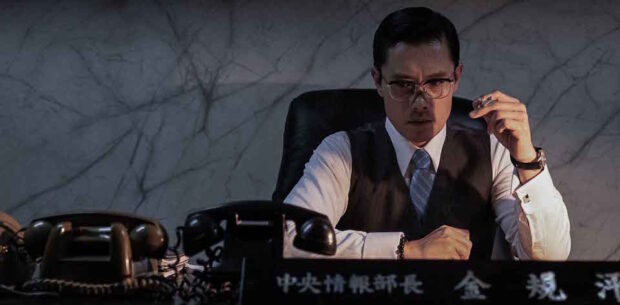
South Korea
South Korean cinema was riding on a high from Bong Joon-ho’s Parasite win at the Oscars, and every SK release was billed as ‘the next Parasite.’ None of them came close, and certainly not in obsessive internet fandom, but it did create more of a presence on Netflix and other streaming networks. (I’ve lost track of co-workers who have told me that they are ‘really into Korean drama right now.’)

Of course, the biggest box office release of the year was PENINSULA, the sequel to Train to Busan. Tonally different to its predecessor, it’s still a cracker of an action/heist film – but with plenty of zombies. Indeed, the Zombie Wave shows no signs of letting up across South Korea with 2020 blockbuster #ALIVE – another great example of an #isofilm – along with period drama Kingdom and TCO’s recent Night of the Undead series both taking bites out of audiences.
Korea had a number of reliably thrilling thrillers, lead by the historical (and slightly controversial) THE MAN STANDING NEXT , a slickly produced capture of a moment in time that remains divisive to this day. The cast and photography are excellent. Similarly, BEASTS CLAWING AT STRAWS is as stylish and twisty as it is stabby. Director Kim Yong-hoon’s debut heralds a new voice to watch and possibly Korea’s answer to the Coen Brothers. Finally, the Netflix debuting A TIME TO HUNT is curious spin on the heist genre, a handsome production with a solid cast that elevates some familiar motifs in what is sure to be a future cult film.

I couldn’t get away without mentioning at least one K-Pop related film. BLACKPINK: LIGHT UP THE SKY is a fascinating documentary that may have made a fan out of me. Caroline Suh’s film digs at least a little bit beneath the surface of the ‘overnight’ sensations, showing us the years of training that goes into that debut.
While the Korean Film Festival was sadly cut short due to technical issues, what we did see was terrific. Zhang Lu’s FUKUOKA is another multicultural exploration of otherness, bringing an excellent cast and a winking sense of humour. Jung Jin-Young’s ME AND ME is a curious mixture of mystery and dreamlike abstraction, pulling on some unexpected threads – and is disarmingly funny at times too. BASEBALL GIRL is a low-key sports drama with a twist that bucks several of the conventions while maintaining a strong sense of character. Speaking of festivals, the experimental animation GHOSTS debuted in Australia at MIFF and it was a bright spot in an already excellent festival.
Finally, while MINARI wasn’t technically a Korean production, the US film from director Lee Isaac Chung is almost entirely in Korean language. As sweeping and character driven as any dustbowl classic, this is a beautifully constructed tale of otherness, family and surviving adversity.
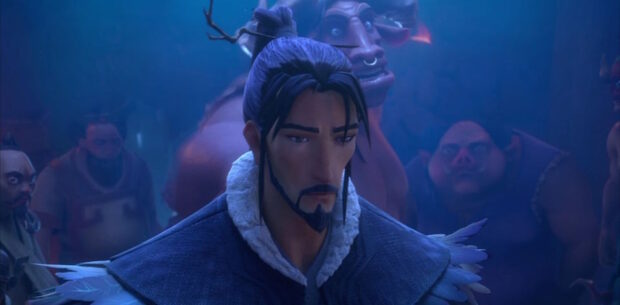
China
It was going to be a massive year for Chinese film. Back in January, I wrote a piece about celebrating the Year of the Rat with a collection of New Year’s films. Yet as Covid started to make its way across China, those films began to drop off schedules. When I visited Melbourne in February, weeks before we all started going into lockdown, the Chinatown Cinema was temporarily shuttered up.
Yet film persisted and China released some major titles at either end of the year. October’s JIANG ZIYA: LEGEND OF DEIFICATION follows last year’s Ne Zha as an impeccably animated film that blends mythology, adult storytelling and modern conventions. It expands a cinematic universe while standing strong as its own tale. Li Yun-bo’s WILD SWORDS similarly remixes the wuxia genre, and it would almost be described as low-key and gentle were it not for the violent subject matter.
Lau Ho-Leung’s CAUGHT IN TIME is a based-on-a-true-story heist film that wears its influences on its sleeve but it’s stylish and there’s some damn fine set-pieces. There is the obvious comparisons with Heat, and John Woo’s The Killer is visually referenced with an actual clip from the 1989 cult classic used several times. Yet this is not to imply that Lau’s film is wholly unoriginal, as it has its own style and vibe to match.

MY PEOPLE MY HOMELAND was criticised as being excessively jingoistic, but to claim this and be done with it would be to ignore the role of the National Day films in Chinese popular culture. An anthology film that successfully lured Chinese audiences back to the box-office, this is a slick affair, and something you’d expect from the presence of Zhang Yimou as supervising director/executive producer.
LEAP, on the other hand, chronicles the history of women’s volleyball in China, and is often a film at war with itself. It’s an unsurprisingly nationalistic look at the successes of the team in the 1980s, the lead-up to the 2008 Beijing Olympics, the 2016 Rio games and beyond. Yet there are some unexpected conflicts with the official party credo on occasion, making this is a little bit more than a showreel.
Less successful was SNIPER, which somehow turned out to be the 100th film I saw this year. Feeling for all the world like an extended TV pilot, which a quick Google tells me exactly what this is, it’s nevertheless got the same levels of jingoistic action, sweeping shots of the desert and dodgy accents that we’ve come to expect (and love) in Chinese blockbusters. It’s a sniper film, so you better believe that there’s plenty of slow-mo bullet shots too.
As the year came to a close, THE RESCUE finally hit cinemas. Dante Lam’s highly anticipated action film may not have been a darling with the critics, but it provided some retro action when we (probably) needed it.
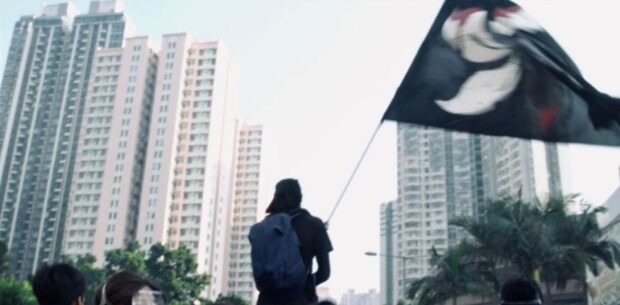
Hong Kong
It’s a massive understatement to say that Hong Kong is having a moment or two right now. In HONG KONG MOMENTS, writer and documentarian Zhou Bing follows seven Hongkongers in this timely and important snapshot of a critical moment in the history of Hong Kong.

On the flip side, co-production THE CALM BEYOND imagines Hong Kong’s future in ways that even Ten Years (2015) could not. An alternatively tense and understated bit of speculative fiction, this collaborative production is a slick affair that is one of the better recent examples of genre fare.
SUK SUK, a film about both ageism and homophobia in Hong Kong, had been on the festival circuit since 2019, but got a wider release internationally this year. On some levels, Yeung’s film is more successful as a message delivery device than as a narrative piece. Yet for an industry where gay characters have frequently been used for comic effect or as the best friend in a rom-com, Ray Yeung’s film represents something of a quantum leap for Hong Kong cinema.
Of course, Dayo Wong Tze-Wah’s THE GRAND GRANDMASTER also came out this year, a throwback and mild parody of martial arts master epics. It is all over the place tonally, but its charismatic cast and some broad comedy is designed to appeal to a wide audience. It’s been a year for lacklustre Hong Kong throwbacks: Donnie Yen headlined a remake of ENTER THE FAT DRAGON, while the ironically named ALL’S WELL THAT ENDS WELL 2020 – the seventh sequel to the 1992 film – saw Raymond Wong return to the franchise.
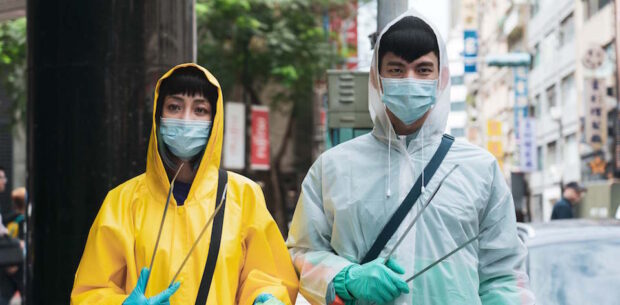
Taiwan
Taiwanese history had an unexpected boost early in the year when Netflix debuted TIGERTAIL in April, a curious tale that aims for understated romance against a historical backdrop, but its thin plotting and character development keeps the audience at arm’s length.

Yet it was iWEIRDO that high the festival circuit this year, with screenings at both the New York Asian Film Festival, Fantasia and beyond. Focusing on a couple in a relationship while living with OCD, it’s as charming as it is real. Made before the pandemic, and shot (almost) entirely on an iPhone – save for a few clear special effects sequences – a couple wearing masks and gloves to go outside doesn’t seem that ‘weird’ at this end of 2020.
Speaking of festivals, the always reliable Taiwanese Film Festival in Australia, now in its third year, highlighted some recent cult favourites. The zombie theme continued with THE GANGS, THE OSCARS AND THE WALKING DEAD, video game adaptation DETENTION and director Hsiao Ya-Chuan in focus.
YOUR NAME ENGRAVED HEREIN hit Netflix in the last weeks of the year. Taiwan’s highest-grossing LGBTQI+ focused film, the remarkable story is based on true events from the late 1980s in Taiwan and contains a tribute to gay rights activist Chi Chia-wei.




